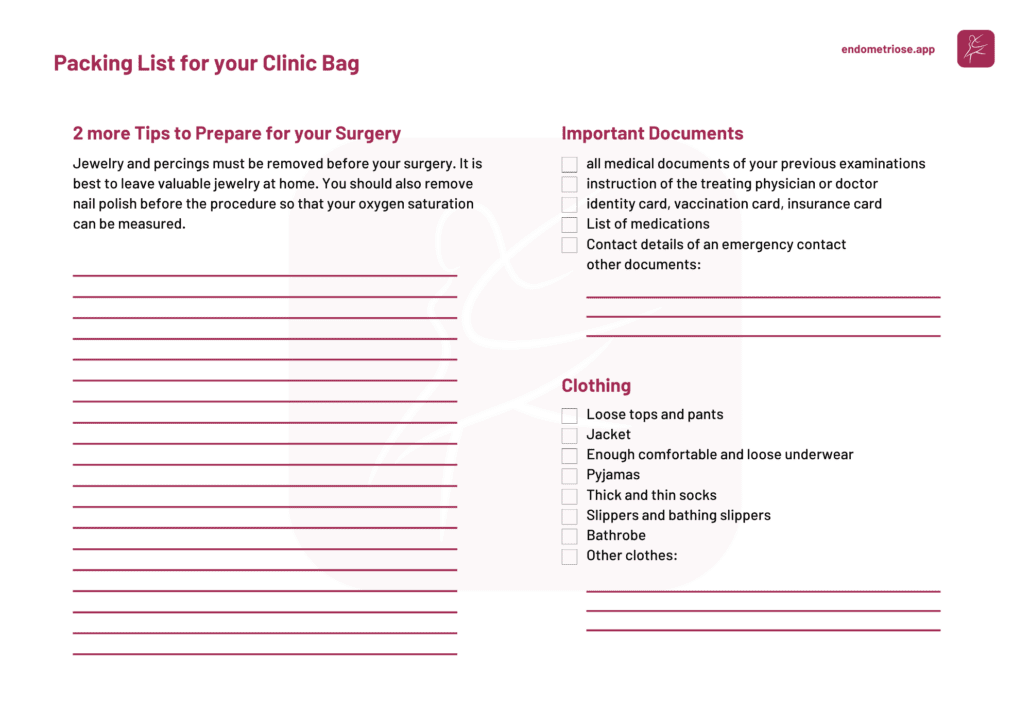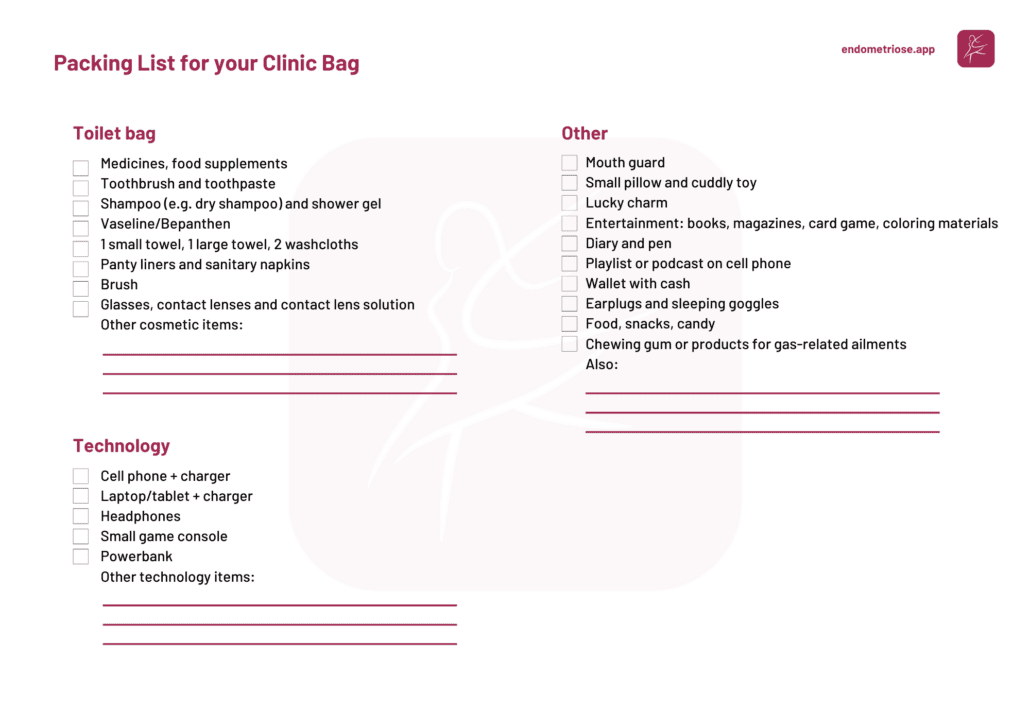Preparing for the Hospital: What Should I Bring?
Normally, the act of packing a bag, backpack, or suitcase is synonymous with excitement and the thrill of embarking on a long-awaited adventure – a journey to new countries or cities to explore.
However, the scenario shifts when the trip is not to a dream vacation spot, but rather to the nearest endometriosis center for a planned surgical procedure.
Accompanying this journey is a mix of emotions: a fluttery sensation in the stomach, a touch of uncertainty, and perhaps even a tinge of fear. These reactions are entirely natural! Especially if the prospect of being in a hospital is unfamiliar territory, adding an extra layer of novelty to the experience.
To lend you a sense of assurance and readiness, we have curated a comprehensive packing list for your hospital sojourn.
Within the blog article, you will uncover insights into the various items featured on the packing list, which might not appear all-encompassing at first glance.
Following that, you can effortlessly download the packing list as a PDF, print it out, and methodically tick off each item as you assemble your essentials.
Essential Documents
When preparing for your hospital stay, having certain key documents at hand is crucial. Among these, your attending physician’s referral takes precedence and should certainly accompany you.
- Medical Records
Collate your previous examination records and results into a folder or binder. This encompasses a variety of materials like X-rays, MRI findings, laboratory reports, and other documents stemming from preliminary examinations or specialist consultations.
- Referral from the Attending Physician
Your attending physician (family doctor, gynecologist, etc.) will issue a referral to the hospital for your procedure. You will present this referral during your preliminary consultation at the hospital.
- Identification, Vaccination and Insurance Cards
Remember to carry your ID, vaccination card, and insurance card. Also, confirm whether a pre-surgery COVID-19 test is required or if it will be conducted on-site at the hospital.
- Medication List
Compile a comprehensive list of all medications you are currently taking. Share this with the hospital staff. Additionally, if you have any medication allergies, ensure they are aware.
- Emergency Contact Details
Provide the hospital staff with the contact information of an emergency contact person, for your peace of mind.
- Queries for Doctors
An immensely vital aspect: your queries, anticipations, and concerns are as crucial as any paperwork. Before your hospital visit, dedicate time to jot down your questions, ensuring you are well-prepared for discussions with the medical team.
- Other Documents
Personalize this section with any additional documents you believe are pertinent to your specific situation.
For your utmost convenience, we’ve prepared a handy packing list that you can easily access and customize as per your requirements. Simply click the link below to download the PDF version:
Clothing
- Loose-fitting tops and pants
When it comes to your clothing selection, prioritize comfort above all else. Opt for loose-fitting tops and pants, focusing on roominess. After your surgery, your belly might feel tender or sensitive. To ensure maximum comfort, pack a pair of loose and cozy sweatpants that will not exert pressure on your stomach area.
- Overjacket
- Adequate supply of comfortable, loose underwear
- Pyjamas
- Thick and thin socks
- Slippers and bathing slippers
- Bathrobe
- Additional clothing items based on your preference
Toilet Bag
- Medication and any necessary supplements
- Toothbrush and toothpaste
- Shampoo (e.g., dry shampoo)
Following surgery, there is a possibility that you may not be permitted or able to take a full shower right away. However, using dry shampoo can still provide you with a sense of freshness.
- Shower gel
- Vaseline or Bepanthen cream
- Moist and oily toilet paper
Before your surgery, it is likely that you will need to undergo bowel preparation. While this is a standard procedure, it can lead to frequent bowel movements. Given the potential sensitivity of your post-surgery state, the coarse hospital toilet paper might cause discomfort after numerous sessions. To ease this, consider packing Vaseline and moist toilet paper. The inclusion of oily toilet paper, in particular, can provide a soothing effect for your bottom during this time.
- 1 small towel, 1 large towel, and 2 washcloths
Even if you are not immediately allowed to take a shower after surgery, you can still maintain a sense of cleanliness by bringing along two washcloths.
- Panty liners and pads
You may experience some post-surgery bleeding.
- Hairbrush
- Glasses or contact lenses, along with contact lens solution
- Makeup
While it is entirely optional and not a necessity to wear makeup in the hospital, the decision is entirely up to you and your comfort. If applying makeup makes you feel better and more at ease, feel free to pack your essentials. Remember, it is your choice whether to wear makeup during your hospital stay. If it brings you a sense of normalcy and confidence, then go ahead and embrace it!
- Other cosmetic items (feel free to customize your list with any other cosmetic items that you personally find essential or comforting)
Electronics
- Cell phone + charger
- Laptop/tablet + charger
- Headphones
- Small game console
- Powerbank
Keep in mind that power outlets in hospital rooms may not always be conveniently located by your bedside. To ensure you can keep your devices charged and stay connected, having a powerbank can be incredibly handy.
- Additional technology essentials (feel free to customize your list of electronic items based on your personal preferences and needs)
Other
- Face mask
Whether it is an FFP2 or a regular mask, make sure you have the right type required for your hospital stay.
- Small pillow and cuddly toy
Bringing something familiar can provide comfort. This is not childish or silly; it is about having something that brings you comfort during your stay.
- Lucky charm
Referring to the previous point about a small pillow or cuddly toy.
- Entertainment: books, magazines, card games, coloring materials
Ensure you have something to keep yourself entertained. While you might be tired most of the time, there might also be moments of boredom.
- Diary and pen
Write down your thoughts and fears. It can have a therapeutic effect!
- Playlist or podcast on your cell phone
As hospital internet might not always be reliable, pre-download a few podcasts or a playlist for entertainment.
- Wallet with cash
Pro-Tip: Bring change for the hospital vending machine.
- Earplugs and sleeping mask
Be prepared for potential disturbances like beeping devices, glowing screens, or snoring neighbors.
- Food, snacks, sweets
If you have dietary restrictions, inquire about the hospital’s offerings. If needed, pack your own snacks. While chocolate is not always the healthiest, sometimes it can significantly contribute to the recovery process, right?
- Chewing gum or products for gas-related complaints
Chewing gum can help alleviate gas passed into your abdomen during laparoscopy.
- Außerdem: (was möchtest du sonst noch unbedingt dabei haben?)
We trust that our hospital packing list has provided you with some useful guidance. If you have any additional suggestions or ideas, feel free to share them with us in the comments.
- Bladder Weakness After Laparoscopy – What can I do? - 16. August 2023
- Preparing for Rehab: What You Will Need - 18. July 2023
- Bladder Weakness After Laparoscopy – What Can I Do? - 9. June 2023


